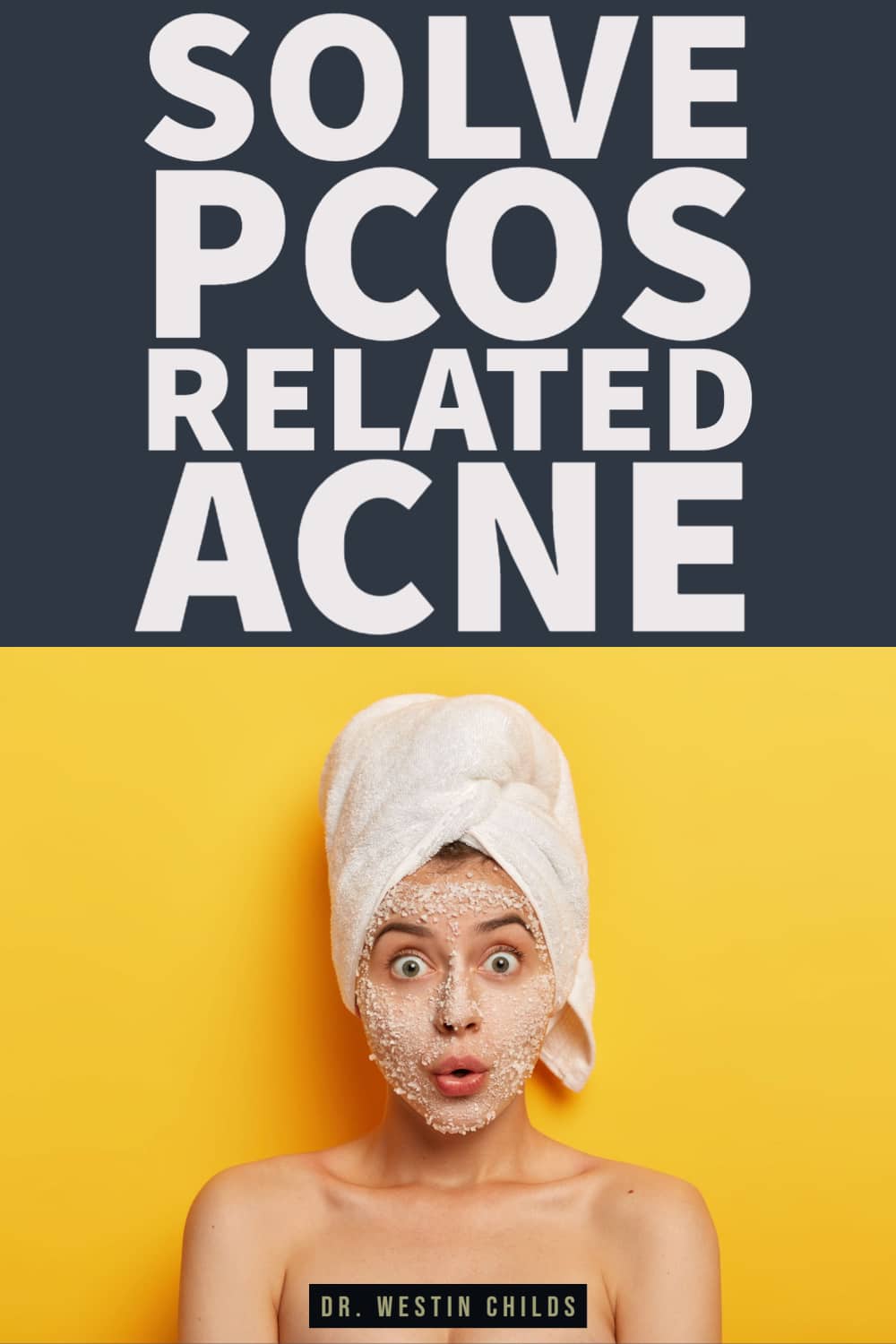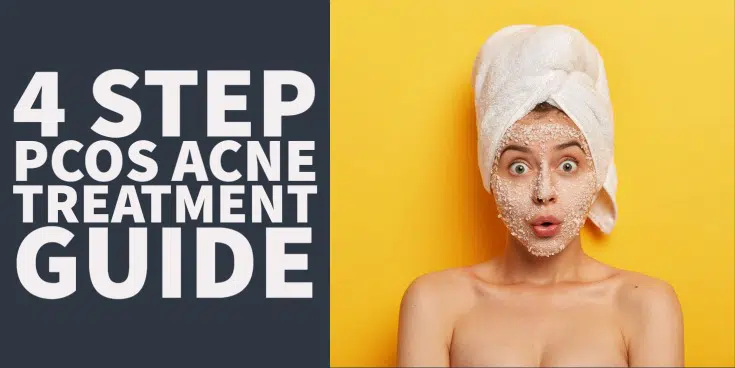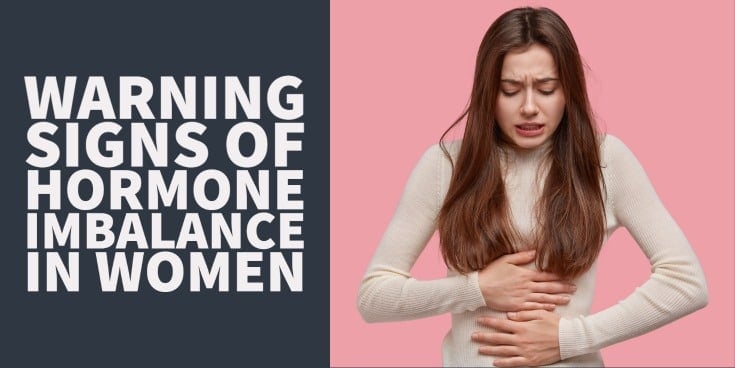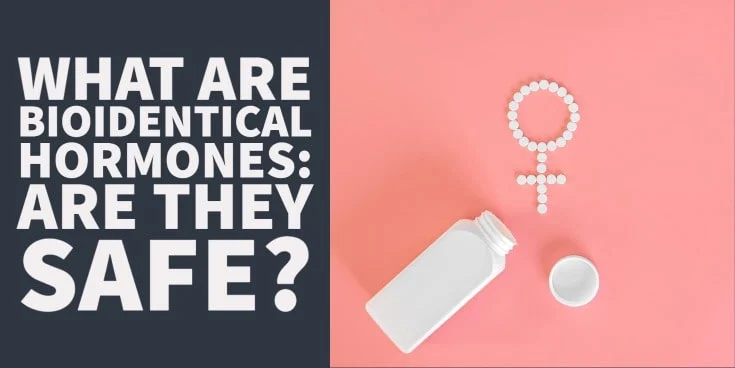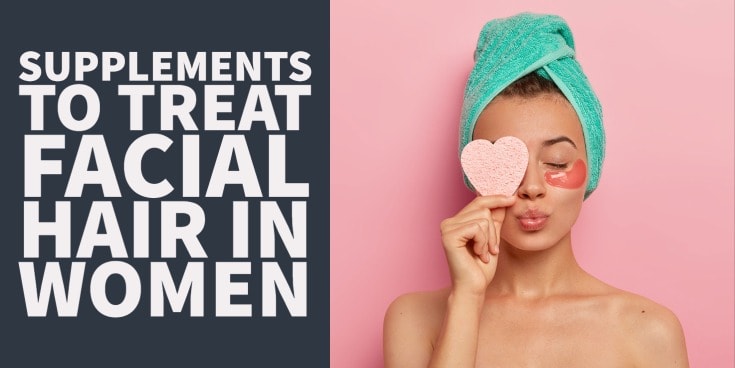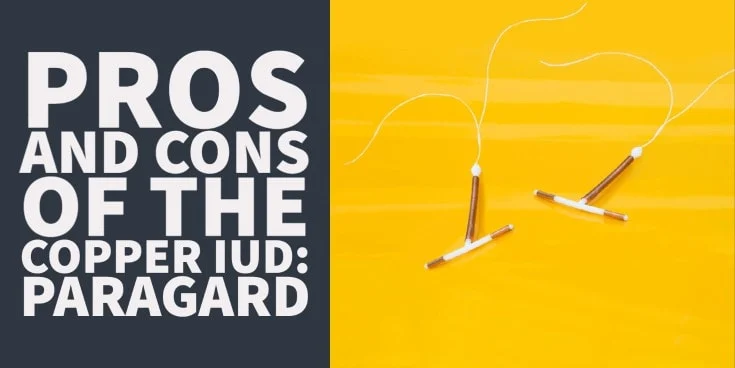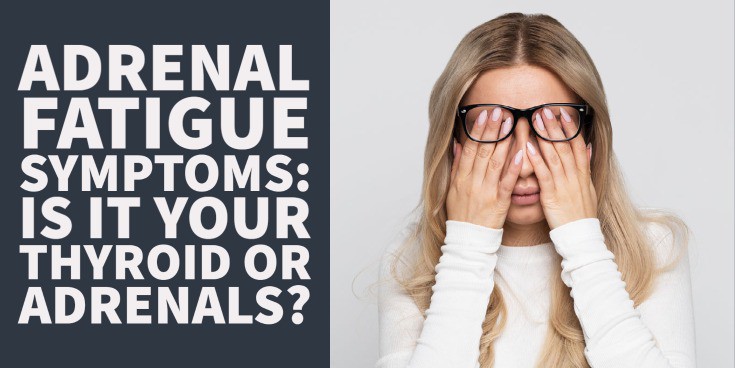If you suffer from PCOS you are probably intimately familiar with acne.
But what causes acne in patients with PCOS?
The answer might surprise you because it’s not one single thing.
Acne in PCOS is multi-factorial, meaning it is often caused by more than one problem.
This is important because it means in order to treat your acne you’ll have to employ several different treatment strategies.
In this post we will discuss these acne treatment therapies in detail:
What causes Acne in PCOS?
The solution to acne often has to do with how you approach treatment.
The problem is that most people focus on the wrong treatment!
Acne is often evaluated as if it is a skin disease with little attention given to what is happening on the inside of your skin.
But, if you have PCOS, you’ve probably noticed a link between your hormones and the type and pattern of acne that you suffer from.
And this link shouldn’t be ignored.
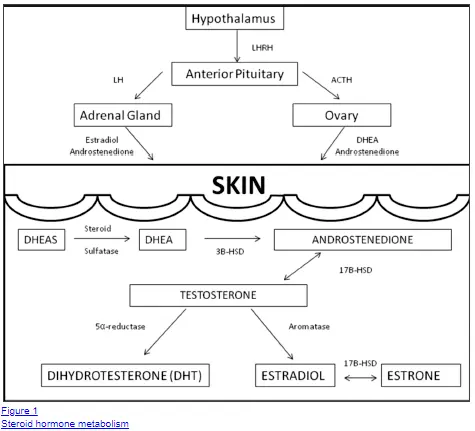
By understanding your hormones you are already 5 steps ahead of the curve in understanding how to treat your acne.
Because the solution has to do with achieving hormone balance.
So why do patients with PCOS often suffer from acne?
Because of the following hormone imbalances:
- #1. Excess Testosterone – Women with PCOS often suffer from excess androgens (including testosterone and DHEA) (1) due to insulin resistance. Testosterone influences sebum (oil) production from sebaceous glands in your skin. The more testosterone activity in your body the more oil that will be produced.
- #2. Thyroid imbalance – There is a connection between PCOS and thyroid disease (2) and, if missed, thyroid disease can make existing acne worse.
- #3. Estrogen/progesterone imbalances – Estrogen and progesterone are supposed to live in harmony with each other by negating the effects that each has on target tissues. An imbalance in one may lead to excessive cellular stimulation which may promote acne (3).
- #4. All of the normal causes of acne – In addition to the hormonal issues above you may suffer from acne from all of the regular issues including slow epidermal turnover, excess oil production, poor diet, genetics, and so on.
These 4 factors create “the perfect acne storm” in women who suffer from PCOS.
The good news is that targeting these imbalances is definitely possible and may lead to an improvement in your symptoms.
The bad news is that the generic acne treatments which include copious use of antibiotics and facial products are not likely to work.
Why?
Because if your acne is caused by hormone imbalances then the only way to treat the issue is by addressing the imbalances!
Hopefully, this makes sense…
Acne Distribution and Hormonal Patterns
Believe it or not, you can learn a lot about acne just by paying attention to when it starts, the distribution of your face, and other qualities of your pimples.
And understanding what is causing your acne is critical because it determines how you need to approach treatment.
This is one of the reasons that treating acne is so difficult and why so many people get it wrong.
The standard approach to acne treatment is to focus SOLELY on therapies that you place on the skin (4).
But you have to realize that many of the causes of acne are actually internal.
This means that no matter how many different creams, lotions, or gels you put on your face, you won’t be able to treat the problem if it’s caused by something INSIDE your body.
The following guide can help you determine what is causing your acne (but realize it should be accompanied by lab tests to confirm).
This will give you a helpful starting point when determining how to target your treatment.
Common patterns and distribution of acne:
- Testosterone-induced (5) acne = Acne on the chin or around the mouth, often accompanied by hair growth on the face (hirsutism (6)) and darkened skin on the back of the neck or on the underarms (7).
- Estrogen-induced (8) acne = Acne that flares with your menstrual cycle or appears on a “timetable”. Often accompanied by breast tenderness, abdominal cramping, and mood changes (depression/anxiety). Estrogen
- Thyroid-induced (9) acne = Cystic acne which is deep in the skin, often accompanied by other symptoms such as fatigue, weight gain, hair loss, and so on. Patients with PCOS should be evaluated for the presence of thyroid antibodies such as TPOab and TGab.
- Other causes of acne = General distribution of acne with whiteheads, blackheads, and so on. This type of acne does not seem to follow a pattern (not associated with your cycle or other hormones, comes and goes randomly, not associated with other symptoms, etc.).
Treating Acne in PCOS without Birth Control
#1. Fixing Acne from the INSIDE (with supplements)
This is #1 for a reason.
Most people, by the time they will have read this information, will have already spent thousands of dollars and hundreds of hours obsessing over what to put ON their skin.
You need to shift gears and start focusing on what you put INSIDE your body.
What do I mean?
I’m talking specifically about the use of certain supplements, vitamins, and minerals to help treat hormonal and PCOS acne.
Believe it or not, these strategies are very effective and may help to kickstart the healing process.
But in order to be effective, they must be accompanied by other therapies (remember you want to “layer” therapies) such as changes to your diet, management of your stress, and of course hormone balancing.
I’ve broken down some of the most common supplements used to treat acne based on the hormonal problem you are facing…
- For testosterone issues: Many women with PCOS suffer from high total testosterone or high free testosterone. This high testosterone often leads to characteristic acne which is often seen in young men. You may be able to reduce androgen (testosterone) influence on the skin by taking Zinc. Zinc can help reduce the conversion of Testosterone to DHT, which is the most potent androgen (10). For best results, you will want to take up to 60mg of Zinc each day.
- For High Estrogen: Often women with PCOS have a combination of high estrogen and low progesterone. High estrogen may lead to acne and can be managed by taking certain supplements that help your body eliminate and metabolize estrogen. Supplements such as DIM and Indole-3-carbinol can be effective tools to improve estrogen metabolism (11).
- For low Progesterone: Treating progesterone won’t necessarily treat your acne, but it may help reduce the impact of estrogen and its influence on your acne. You can learn more about how to manage progesterone here.
- For gut issues: Probiotics should be considered an important part of any acne treatment, but especially for those with PCOS. There is a strong connection between your gut and your skin (12), and the use of topical probiotics (those you put directly on your face) and the use of ingested probiotics (those you take by mouth) can help improve your GI function and help reduce acne.
- For Thyroid issues: For thyroid issues, you will want to focus on supplements that improve free T3 in your body. Free T3 is the active thyroid hormone and is often very low in patients with hypothyroidism (even for those who take thyroid medications). Zinc, Selenium, and Iodine can help improve thyroid production in the thyroid gland and improve peripheral thyroid conversion in other tissues. In addition, you may benefit from the use of thyroid medications that contain T3 such as NDT and Cytomel.
- For Insulin Resistance: Another tactic that can be useful in treating acne in PCOS is to address insulin resistance. Insulin resistance doesn’t cause acne by itself but it may lead to the hormonal imbalances that DO cause acne such as high testosterone. Treating insulin resistance may, therefore, be a backdoor treatment for acne (though not quite as effective as other therapies listed here). Using supplements such as berberine, fish oil, and alpha-lipoic acid may all be beneficial.
When taking supplements do your best to target your supplementation to the specific issues that you are dealing with.
Also, try to avoid taking more than 3-5 supplements at once as this might be counterproductive and lead to decreased absorption.
If you don’t know where to start then you might find the best success by taking the combination of zinc, indole-3-carbinol, and selenium.
This combination hits the major hormone imbalances common among women with PCOS.
#2. Fixing acne from the OUTSIDE
While treating acne from the inside is important (and necessary), you don’t want to neglect the value of using high-quality products directly on your skin.
Just make sure to use these therapies in combination with the supplements we discussed previously.
You don’t need to go overboard with your skin care regimen, but you should make sure you hit the basics:
- 3-step face cleansing system: Cleanser, toner, and moisturizer (water-based, not oil-based) – This should be a standard for you regardless of age, medical condition, and acne status. Cleansers help naturally exfoliate the skin while toners bring back pH balance. Moisturizers will also help nourish the skin.
- Vitamin C Serum – Vitamin C serum is a natural and powerful way to combat acne and to also improve the quality of your skin. Vitamin C also helps reduce healing time, treats existing acne, and may lighten and treat previous acne scars (13). Vitamin C serum is probably one of the most well-studied cosmetic ingredients and has many studies showing how effective it is. It might be tempting to consume Vitamin C by mouth, but taking Vitamin C by mouth does not actually make it to your skin before it’s broken down in your intestinal tract. This means you have to use a high-quality vitamin C serum if you want to get the benefits of Vitamin C.
- Vitamin A Serum – Vitamin A, like Vitamin C, is another powerful and natural vitamin that may help treat acne and improve your skin. Vitamin A is an effective tool that is often used by dermatologists to treat acne (14) (sometimes in the form of Accutane). Taking oral Vitamin A may also be helpful for some individuals. If you choose to use Vitamin A serum make sure you find a product that contains Retinol. If you opt for oral Vitamin A then you’ll want to use a product like this.
- Powerful glycolic acid – Glycolic acid can help directly treat acne (15) and is often recommended for men who suffer from acne in their adolescent years. Glycolic acid can be used as a cleanser (remember the 3-step process above) in your daily regimen. Look for a strong glycolic acid product that contains at least 4.9% glycolic acid like this one.
#3. Diet
Diet is another way that you can influence and treat acne (16).
Your diet, whether you realize it or not, has a powerful impact on your hormones and we already know the powerful impact that hormone balance has on your skin.
With this in mind, you can think about your diet as a tool you can use to alter hormone balance and therefore treat acne.
While there are many diets to choose from (and the one that fits your body will take some effort on your part to find) there are some general rules that you should follow when it comes to your diet:
- Eat only organic foods- Eat plenty of fruits and vegetables (organic when possible)
- Focus on the consumption of brassica vegetables which are naturally rich in indole-3-carbinol
- Cut back or eliminate dairy products (milk, cheese, etc.)
- Cut back or eliminate wheat, grains, and gluten
- Eliminate sugar and excess refined carbohydrates
- Eliminate the intake of inflammatory fats such as soybean oil, canola oil, corn oil, and so on
- Drink up to 1 gallon of water per day
As long as you stick to these guidelines it doesn’t matter if you opt for a diet like Whole30 or the ketogenic diet, you should still be in a great spot.
#4. Medications
Can medications help treat acne if the other options don’t work?
The answer is maybe.
Pharmaceutical medications may be helpful for managing acne but they often don’t address the underlying cause.
This approach may be helpful in some situations, especially if you have failed less invasive therapies or if your acne is causing significant distress to your self-esteem.
If you opt to use medications just realize that they may not be a great long-term solution.
Medications that may be helpful:
- Tretinoin – Tretinoin is a more powerful and potent topical formulation of Retinol (Vitamin A). Tretinoin is often used for anti-aging purposes by cosmetic dermatologists, but it can also be used to treat acne (17). Topical tretinoin may cause slight redness and flaking of the skin, but it may be worth the trade if it manages your acne. Tretinoin is similar to retinol but more powerful (one is prescription strength while the other is over-the-counter strength).
- Spironolactone – Spironolactone is a medication that can be used off-label to treat acne, especially if other more traditional therapies have failed. Spironolactone was originally developed and used as a medication to treat hypertension (high blood pressure) and heart failure, but it was later found to have anti-androgenic effects (18). Spironolactone may, therefore, be effective at reducing the impact of testosterone and androgens on your skin and may treat acne by inhibiting sebaceous gland activity (oil production on your face). It is especially helpful in treating acne caused by excess androgens in PCOS. This medication may also be helpful in reducing hirsutism.
Medications to avoid:
- Birth control pills – Birth control medication may be helpful at reducing acne (but be careful because it can also make acne worse), but it often comes at the risk of shutting down normal hormone regulation in your body. It is often better to try and naturally balance your hormones before taking this option.
- Oral antibiotics – Oral antibiotics may do more harm than good in the treatment of acne as they may lead to damage of your microbiome. Topical antibiotics may be preferred over oral antibiotics, but even then it’s probably better to opt for the use of topical probiotics and oral probiotics.
- Topical antibiotics – Acne, in PCOS, is generally not caused by bacterial overgrowth. Topical antibiotics tend to be effective in the treatment of acne vulgaris caused by the bacteria p. acnes.
Treating Existing Acne Scars from PCOS
What about treating existing acne scars?
Many of the therapies that we have touched on above address the root cause of acne and their purpose is to stop acne, but they don’t necessarily target existing acne scars.
Treating acne scars is another topic, but we can briefly go over some of the best therapies available to treat them:
- Microneedling therapy – Microneedling therapy helps break up scar tissue underneath the skin and can seriously help improve the texture of the skin and reduce acne pock marks (19). Microneedling is a therapy in which a device delivers hundreds to thousands of tiny needle punctures to the superficial layers of your skin. For best results, you will probably need 6 to 10 microneedling sessions. You should notice a slight improvement in your acne scars after each session.
- Laser therapy – Laser resurfacing therapy, like microneedling, helps to break up scar tissue and promote collagen growth (20). Laser therapy is more expensive and may require more downtime when compared to microneedling.
- Vitamin C serum – Vitamin C serum (already discussed) can be used in conjunction with these therapies to help reduce skin healing time and promote collagen and elastin growth.
Final Thoughts
The bottom line?
It is possible to treat acne even if you have PCOS.
Make no mistake, though, it may be difficult and may take some time, but it is certainly possible.
The key to success is to use multiple therapies including oral supplements, topical therapies, dietary changes, and maybe medications (if necessary).
When considering whether or not to use medications just realize that the best approach is to balance the underlying hormone imbalances that cause acne instead of covering them up.
Now I want to hear from you:
Are you suffering from PCOS acne?
If so, what kind of therapies have worked for you? Which haven’t?
Are you familiar with the therapies listed in this guide?
Leave your comments below so that we can add to the existing knowledge here.
Scientific References
#1. https://www.ncbi.nlm.nih.gov/pubmed/19390322
#2. https://www.ncbi.nlm.nih.gov/pmc/articles/PMC4287775/
#3. https://www.ncbi.nlm.nih.gov/pubmed/8238188
#4. https://www.ncbi.nlm.nih.gov/pmc/articles/PMC3080563/
#5. https://www.ncbi.nlm.nih.gov/pmc/articles/PMC2923944/
#6. https://www.ncbi.nlm.nih.gov/pmc/articles/PMC2856356/
#7. https://www.ncbi.nlm.nih.gov/pmc/articles/PMC4144206/
#8. https://www.ncbi.nlm.nih.gov/pubmed/11712049
#9. https://www.ncbi.nlm.nih.gov/pubmed/21521376
#10. https://www.ncbi.nlm.nih.gov/pubmed/8613886
#11. https://www.ncbi.nlm.nih.gov/pubmed/12840226
#12. https://www.ncbi.nlm.nih.gov/pmc/articles/PMC3038963/
#13. https://www.ncbi.nlm.nih.gov/pmc/articles/PMC5579659/
#14. https://www.ncbi.nlm.nih.gov/pubmed/15675886
#15. https://www.ncbi.nlm.nih.gov/pubmed/9107290
#16. https://www.ncbi.nlm.nih.gov/pmc/articles/PMC4884775/
#17. https://www.ncbi.nlm.nih.gov/pmc/articles/PMC3225141/
#18. https://www.ncbi.nlm.nih.gov/pmc/articles/PMC3315877/
#19. https://www.ncbi.nlm.nih.gov/pmc/articles/PMC4509584/
#20. https://www.ncbi.nlm.nih.gov/pmc/articles/PMC4134658/
